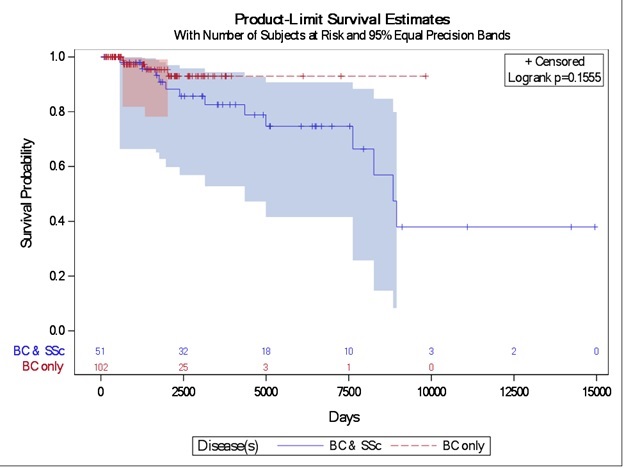Session Information
Session Type: ACR Poster Session A
Session Time: 9:00AM-11:00AM
Background/Purpose: Breast cancer has been shown to be more prevalent in patients with systemic sclerosis (SSc) compared to that in the general population. A close temporal correlation between the onset of SSc and breast cancer has been demonstrated, particularly in patients with anti-RNA polymerase III antibody, suggesting a possible pathogenic or paraneoplastic association in this subset of patients. Certain chemotherapeutic agents and radiotherapy may be avoided in patients with SSc. The goal of this study was to demonstrate the impact of scleroderma on breast cancer treatment options and outcomes. We also wanted to assess the association of SSc to the specific histopathologic subtype, hormone receptor status and human epidermal growth factor receptor 2 (HER2) oncogene status of breast cancer.
Methods: A retrospective chart review was performed to compare patients with breast cancer with and without SSc that were seen within the last 10 years at our institution. For comparison, a random number generator was used to select 102 out of 9157 breast cancer patients without SSc who were diagnosed and treated at our institution over the same time period. Data on demographics, clinical characteristics, breast cancer treatments, and survival rate were collected. Numerical variables are compared between groups using ANOVA and two sample t-tests. Categorical variables were compared using either Pearson’s chi-squared test or Fisher’s exact test. Survivor functions were estimated using the Kaplan-Meier method and differences in survivor functions were tested for with log-rank tests.
Results: Fifty-one patients with SSc with a history of breast cancer were identified; 43.1%, 3.9% and 7.8% of patients with SSc had anti-centromere, anti-Scl-70 and anti-RNA polymerase III antibodies respectively. Patients with RNA polymerase III antibody had shorter interval between SSc and breast cancer onset compared to the patients with anti-Scl-70 (11.7 vs 51.2 months, P 0.43) and anti-centromere (11.7 vs 66.5 months, P 0.07) antibodies. Patients with breast cancer and SSc less frequently had invasive ductal carcinoma compared to breast cancer patients without SSc (47.1% vs 63.7%, P 0.049). The percentage of estrogen and progesterone receptor positivity as well as HER2 oncogene positivity were similar in the two groups. There was a trend towards receiving less radiotherapy in patients with SSc and breast cancer (52.9% vs 68.6%, P 0.058). The decision to receive chemotherapy, hormonal therapy and immunotherapy were similar between the two groups. Mortality rate was much higher in breast cancer patients with SSc compared to those without SSc (25.5% vs 3.9%, P <0.001) although survival analysis does not show significant difference (Figure1). 
Conclusion: Breast cancer patients with SSc have higher mortality rate compared to those without. Further studies are needed to identify specific treatment strategies for this group of patients.
To cite this abstract in AMA style:
O-charoen P, Glass K, Messner W, Chatterjee S. The Relationship Between Systemic Sclerosis and Breast Cancer and the Effects on Treatment Outcome [abstract]. Arthritis Rheumatol. 2016; 68 (suppl 10). https://acrabstracts.org/abstract/the-relationship-between-systemic-sclerosis-and-breast-cancer-and-the-effects-on-treatment-outcome/. Accessed .« Back to 2016 ACR/ARHP Annual Meeting
ACR Meeting Abstracts - https://acrabstracts.org/abstract/the-relationship-between-systemic-sclerosis-and-breast-cancer-and-the-effects-on-treatment-outcome/
